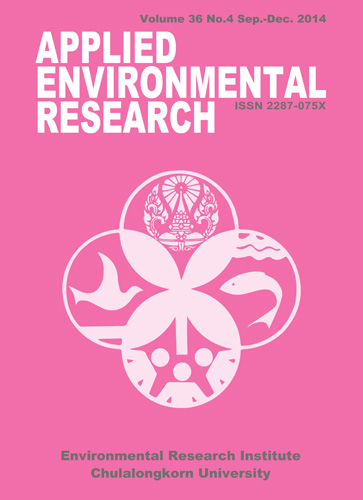Dinoflagellate Bloom Produced by Protoperidinium divergens Response to Ecological Parameters and Anthropogenic Influences in the Junglighat Bay of South Andaman Islands
Main Article Content
Abstract
The bloom-forming dinoflagellate, Protoperidinium divergens has been linked with coastal eutrophication in tropical and subtropical regions. Moderate to intense harmful algal bloom of dinoflagellates Protoperidinium divergens (33,500 cells mL-1) was observed during June 2012 in Junglighat Bay of Port Blair in South Andaman. Bloom of Protoperidinium divergens was observed for four days and declined afterwards due to heavy rainfall with low seawater temperature of 24 to 26°C. A total of 63 species and 33 genera were identified. In the present investigation, the following species of phytoplankton and zooplankton were found to be common; phytoplankton such as Amphora sp., Bacteriastrum sp., Chaetoceros sp., Coscinodiscus sp., Rhizosolenia sp., Gonyaulax sp., Protoperidinium sp., Pyrophacus sp. and zooplankton such as Paracalanus sp., Euterpina sp., fish eggs, Copepod nauplii, Codonella sp. and Tintinnopsis sp. Hydrobiological parameters analyzed during and post-bloom showed dissolved oxygen in the range of 2.23 – 4.46 mg L-1. Nutrients such as nitrate varied from 0.37-1.118 µmol L-1, nitrite from 0.37-1.118 µmol L-1, phosphate (0.10-0.289 µmol L-1) and silicate (6.22-9.333 µmol L-1). Anthropogenic activities increased eutrophication in Junglighat Bay and led to nutrient enrichment in the water column, although precipitation could also have favoured the outbreak of these dinoflagellates.
Article Details

This work is licensed under a Creative Commons Attribution-NonCommercial 4.0 International License.
Published articles are under the copyright of the Applied Environmental Research effective when the article is accepted for publication thus granting Applied Environmental Research all rights for the work so that both parties may be protected from the consequences of unauthorized use. Partially or totally publication of an article elsewhere is possible only after the consent from the editors.

